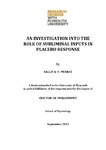An Investigation into the Role of Subliminal Inputs in Placebo Response
| dc.contributor.supervisor | Hyland, Michael | |
| dc.contributor.author | Pearce, Sally A F | |
| dc.contributor.other | School of Psychology | en_US |
| dc.date.accessioned | 2016-05-05T16:04:42Z | |
| dc.date.available | 2016-05-05T16:04:42Z | |
| dc.date.issued | 2016 | |
| dc.identifier | 210823 | en_US |
| dc.identifier.uri | http://hdl.handle.net/10026.1/4582 | |
| dc.description.abstract |
According to the network theory of psychoneuroimmunology, (Hyland, 2011a), the placebo response is a short-term, problem solving response to a variety of inputs processed via the ‘infornet’. However, within the current infornet model of placebo response, these inputs are categorized as either conscious verbal inputs, or inputs learnt via traditional conditioning mechanisms. This thesis investigates the extent to which other ‘higher-order’ subliminal inputs may also play a part in determining placebo response. The findings presented here found no reliable effect of subliminal priming information on placebo response in a short-term placebo context. Further research is needed to determine if subliminally presented information is more likely to be used within a long-term placebo context. The lack of consistency in findings across this set of experiments supports replication criticisms leveled at the subliminal priming field, and the claim that differences in trivial contextual details may be the underlying cause of these inconsistencies. Theoretical and practical implications of these findings are also discussed. | en_US |
| dc.language.iso | en | en_US |
| dc.publisher | Plymouth University | en_US |
| dc.subject | Subliminal Priming | |
| dc.subject | Placebo | en_US |
| dc.title | An Investigation into the Role of Subliminal Inputs in Placebo Response | en_US |
| dc.type | Thesis | |
| plymouth.version | Full version | en_US |
| dc.identifier.doi | http://dx.doi.org/10.24382/4795 | |
| dc.identifier.doi | http://dx.doi.org/10.24382/4795 |
Files in this item
This item appears in the following Collection(s)
-
01 Research Theses Main Collection
Research Theses Main


